Iranian ambitions breed scepticism and fear in Israel
- Published
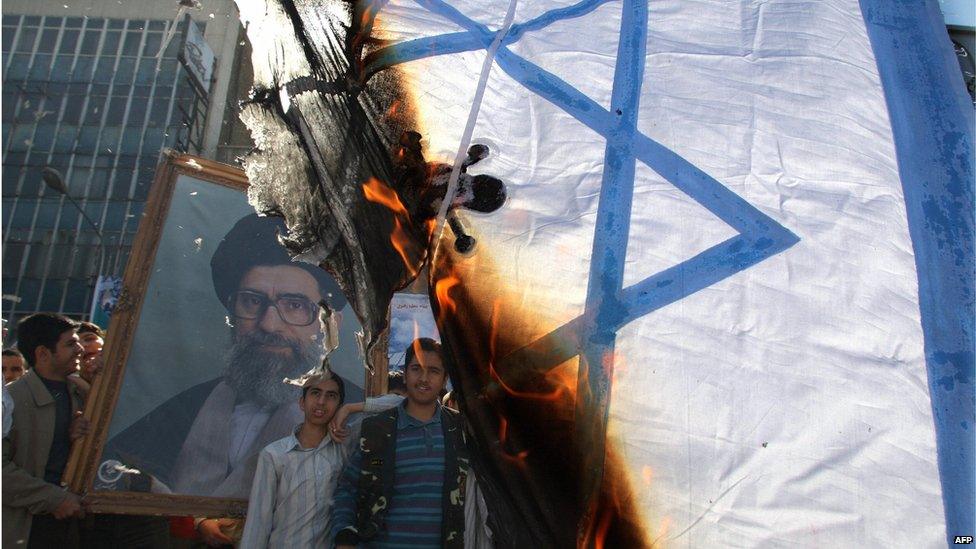
Israel fears it would be the first target of an Iranian nuclear bomb, although Tehran denies seeking atomic weapons
When the Israeli authorities staged a major civil defence exercise this month, they did everything they could to make it feel real.
The mournful fluctuation of air-raid sirens echoed across the sunny streets and squares of big cities.
And teachers shepherded well-drilled groups of children briskly down school corridors.
Mock radio news bulletins made no effort to disguise the source of the imaginary attack - it was Hezbollah, the heavily-armed proxy army which Iran equips and maintains in southern Lebanon.
The drill may have been routine but the timing leant it a greater sense of urgency - it came as the US-led world powers built up to the deadline for a diplomatic deal with Iran offering a reduction in crippling economic sanctions in return for a verifiable cap on Iranian nuclear ambitions.
Israeli leaders are worried that those world powers just don't "get" Iran in the way that they do.
Israel is implacably determined to stop the Iranians acquiring a nuclear weapon and sees it without question as the greatest danger facing the Middle East, and perhaps the world.

Dr Rafi Beyar explains the underground fortified hospital at Rambam Health Care Campus in Haifa

Israeli mindset
For a whole variety of reasons they fear that the US-led world powers negotiating with the Iranians don't feel the fear as deeply or the determination quite as adamantly.
Europe, they worry, is too quick to see the replacement of the stridently hardline President Mahmoud Ahmadinejad with the more emollient Hassan Rouhani as evidence of real political change rather than a simple piece of political window-dressing designed to fool them.
They may be ready to risk making a deal, in the Israeli analysis, to help consolidate a political change that was never really real.
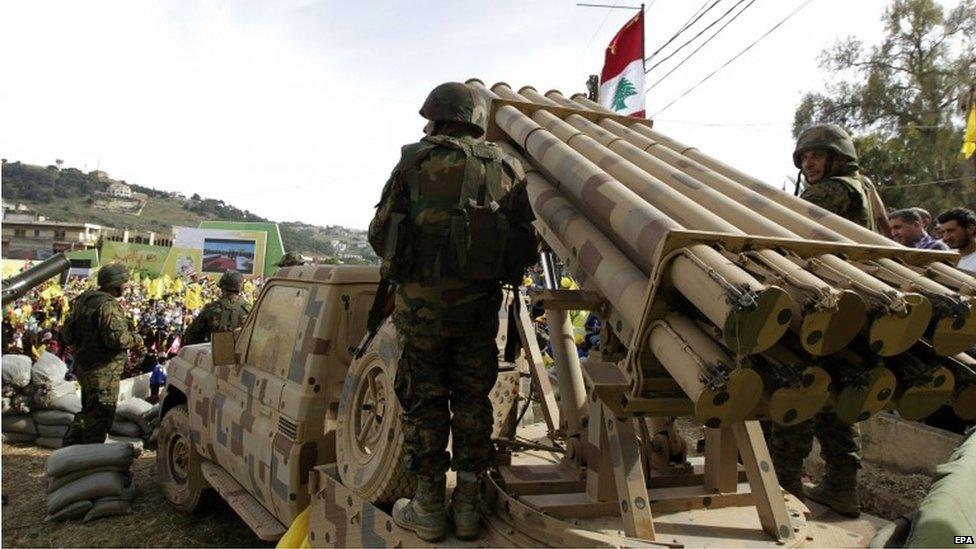
Hezbollah receives financial and military support from Iran
And there's a fear that Barack Obama sees the potential in the rehabilitation of Revolutionary Iran for a kind of personal international legacy - his equivalent of a "Nixon in China" moment.
But above all there's a real and immediate fear that Israel is the likeliest target for an Iranian bomb.
An IDF graphic showing what it says are Hezbollah military installations embedded in a village close to the Israeli border
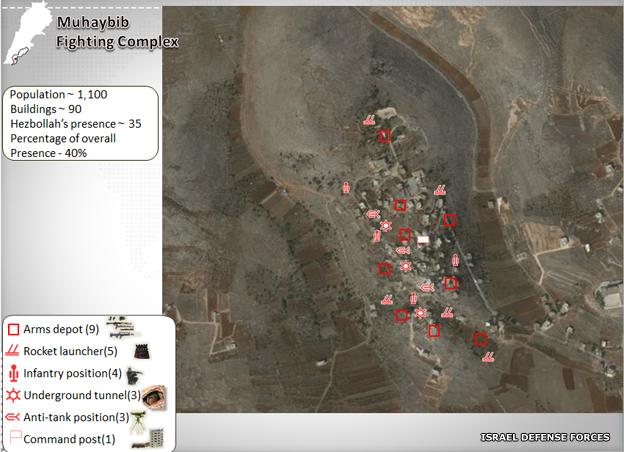
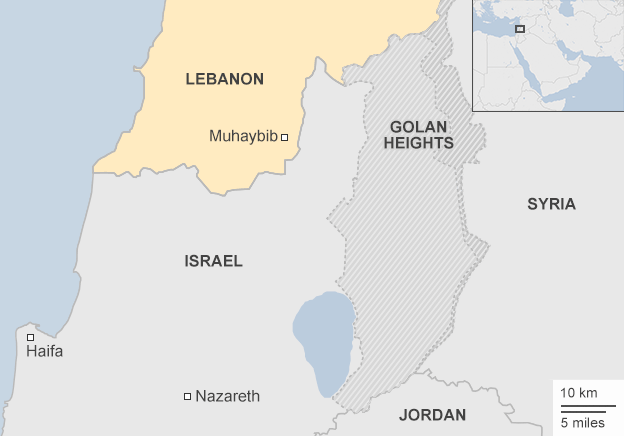
It's worth pointing out of course that Iran denies absolutely that it's attempting to acquire nuclear weapons and insists that its uranium-enrichment programme is intended for peaceful civilian uses, like electricity generation or cancer treatments.
Ronen Bergman, who's one of Israel's best - and best-briefed - writers on defence and intelligence matters, says it's easy to gauge how deep and how real that concern is for ordinary Israelis.
"At the height of the tensions with Iran," he says, "as someone who was seen to know something about this issue, I had people stopping me in the street every day, every hour, asking me not if but when President Ahmadinejad would press the 'red button' once he had a red button to press...
"I don't think he would have, but that's the Israeli mindset, that once the Iranians get their hands on a nuclear warhead they would launch it at Israel."
'Determined enemy'
Israel is not a party to the talks between Iran and the world powers but it has been working desperately behind the scenes to stiffen the American and European positions, and arguing that a harder bargain could - and should - be driven.
The points of detail are important - should international nuclear inspectors, for example, have the right to make unannounced visits to Iranian military bases and to industrial facilities in remote stretches of desert to ensure that Tehran isn't cheating.
A retired officer from Israel's secret service, Mossad, told us that issues related to Iran take up most of the time and energy of Israel's intelligence services.
Former Israeli Minister Dan Meridor: Arab states should see Israel as a partner against common threats
That calculation would include not just Iran's nuclear programme but its support for Israel's enemies like Hezbollah in Lebanon and Islamic Jihad and Hamas in Gaza.
So Israel sees Iran as a determined, energetic and dangerous enemy - but not an unstoppable one.
The former Israeli Intelligence Minister, Dan Meridor, believes that the tough current sanctions in place against Iran have been working because they include such tough financial measures as the denial of access to payment systems for international trade.
Iran's goal now is to get those sanctions relaxed or revoked, but Mr Meridor says the US-led negotiators should be careful not to underplay their hand.
"They [the Iranians] are serious and they are smart," he told us, "but they also understand what the Germans used to call Realpolitik.
"When there was heavy pressure on their economy by the European Union and the Americans and others, you saw a change of face and maybe a change of behaviour on the Iranian side. So I don't think we are that weak and I don't think they are that strong.
"If we act smartly we can slow processes and hopefully move things in a better direction."
Pre-emptive strike?
Israel's many enemies in the Middle East scent hypocrisy in all of this. No-one in the region doubts that the Jewish State itself has had nuclear weapons for years and no-one is fooled by its long-standing policy of simply declining to comment on the issue.
The Israeli case is that Iran is different.
Some Israelis certainly think there's a possibility that the country's religious leaders want The Bomb so that they can carry out their threat to wipe Israel off the map.
But others fear that Iran's ambition is to consolidate itself as a regional superpower - one that no-one will dare to try to push around.
As a revolutionary power it already sees itself as an exporter of revolution - or an exporter of terrorism, as Israel and the United States would see it.
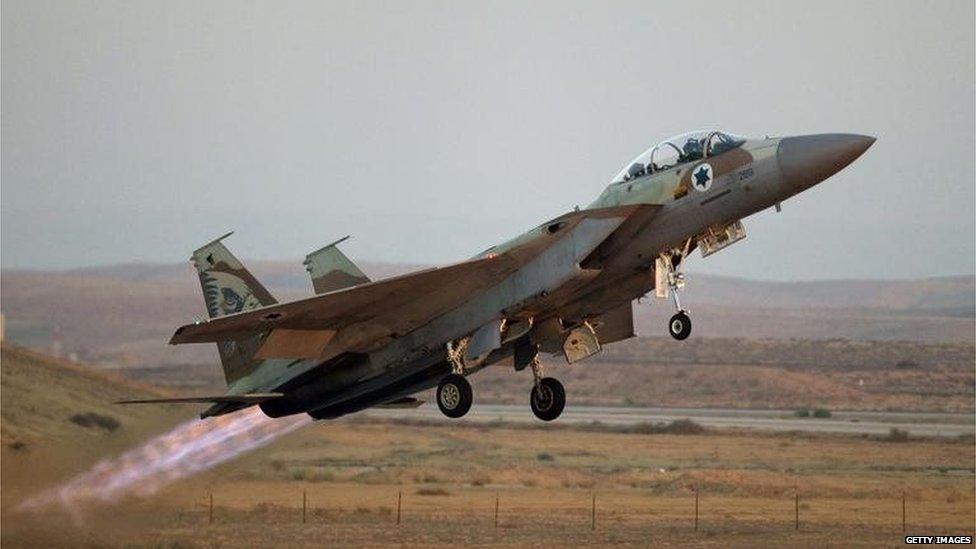
Israel has warned it would take military action to stop Iran obtaining a nuclear weapon
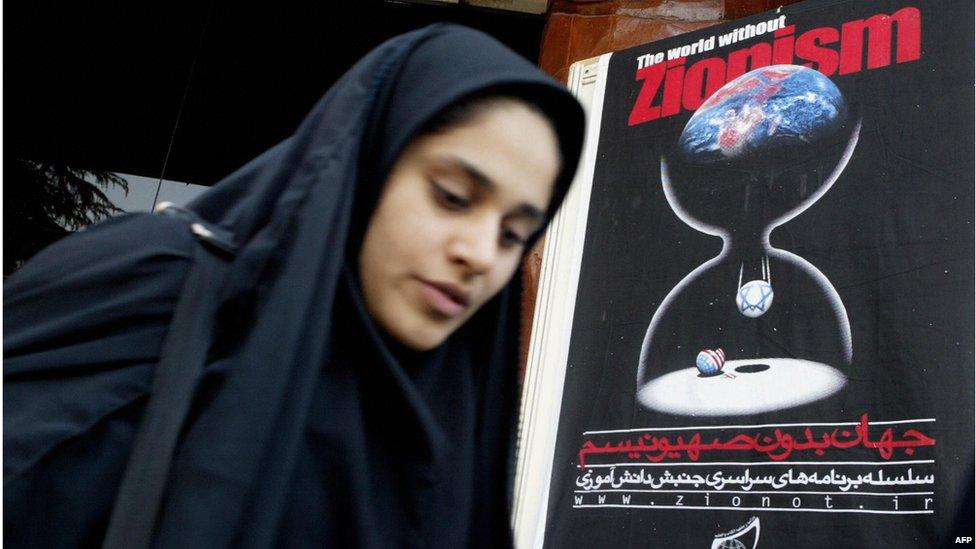
Iran has for years called for Israel's elimination
And as the major force in the world of Shia Islam, it feels it has the right to arm and protect Shia communities across the Middle East - as it does in Lebanon, Iraq, Syria and Yemen.
Israel's nightmare is that those assertive interventionist policies would be a lot more assertive and interventionist if Iran had the extra strategic confidence that comes with The Bomb.
That's why for many years debate on this issue was dominated by speculation that Israel was preparing to launch pre-emptive air strikes against the Iranian nuclear infrastructure.
That speculation has receded in the last couple of years - apparently because Israel was prepared to give new, tougher sanctions time to work.
But the intelligence expert Ronen Bergman says that threat remains part of the overall equation.
Israel has already attacked nuclear facilities in Iraq in 1981 and Syria in 2007 and remains committed to the doctrine articulated by former Prime Minister Menachem Begin that Israel would never allow an enemy committed to its destruction to acquire the means to carry out that threat.
"This is why," says Mr Bergman, "any Israeli prime minister would order the bombers to take off against the Iranian nuclear project if he receives reliable intelligence that Iran is getting too close to a bomb."
Preparing for worst
Any such attack would trigger an Iranian response - delivered either directly through Iran's own Missile Forces or through Hezbollah on Israel's northern border.
Those recent civil defence exercises in Israeli cities were part of the war-gaming for that "Day After" scenario.
You can find on the internet a startling Israeli-made home movie with disturbingly powerful special effects which portrays an Iranian nuclear attack on Israel - it's called The Last Day, external.
Israel has to rely on those American-led negotiators to ensure that such an attack remains the stuff of dark and remote fantasy.
But as this process comes down to the wire they remain sceptical and fearful.